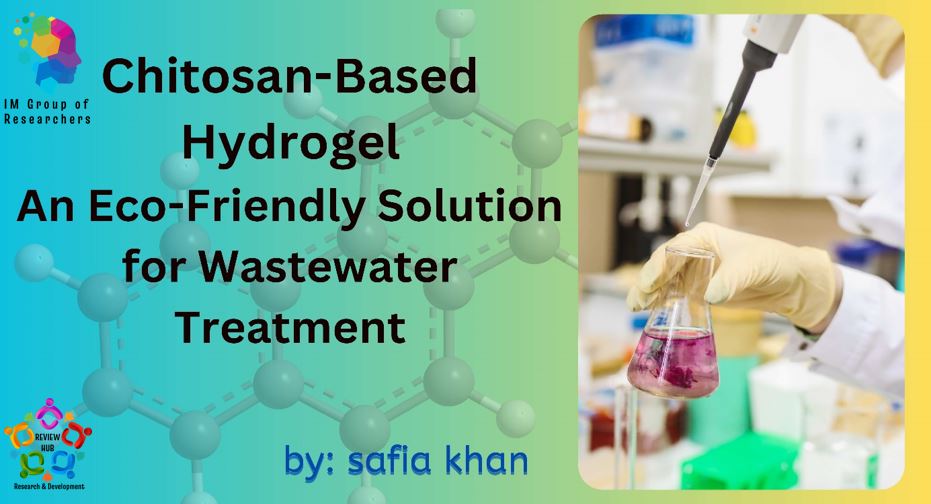Chitosan-Based Hydrogel: An Eco-Friendly Solution for Wastewater Treatment
Chitosan-Based Hydrogel: An Eco-Friendly Solution for Wastewater Treatment. The issue of waste water pollution is one of the major environmental problem, which endangers people and the planet. With high level of industrial activities as well as growths of towns and cities in many parts, this leads to increasing amounts of pollutants to be dumped into water sources. However, scientists and scientists have made endless efforts to find better ways of getting rid off the waste-waters. In recent times, one of the notable ways that have garnered broad attention is using chitosan-based hydrogels. Water purification using biocompatible and biodegradable polymer – chitosan.This article will discuss on the characteristics, benefits as well as uses of chitosan based hydrogels in waste water purification.
Author
Safia Khan
LinkedIn: Click here to see Safia’s profile
Understanding Chitosan-Based Hydrogels
Being a derivative of chitin, which is a naturally-occurring biopolymer found in the exoskeletons of species such as shrimps and crab. It is therefore considered a suitable constituent for several practices and uses such as treating wastewater. Chitosan has a large capacity for absorption when it is made into a hydrogel through simple chemical modification of chitosan. Hydrogel consists in a three dimensional assembly of hydrophilic polymer strands which can hold water in relatively large volumes.
Physical Aspects of Chitosan Hydrogels
High Water Absorption Capacity: Hydrogels based on chitosan are also capable of absorbing great amounts of water and thus suitable for removing aquatic contaminant in wastewater.
Biocompatibility: It should be noted that chitosan is biocompatible hence its safety for use in water treatment methods without causing toxicity to the surrounding environment.
Biodegradability: Besides, these hydrogels are environmentally friendly, meaning that they can dissolve and thus reduce wastes which could be a threat to the environment.
Adsorption Properties: The ability of chitosan based hydrogels to adsorb heavy metals, organic dyes and other contaminants in wastewater make it possible to remove substances out of the water.
The Use of Chitosan Based Hydrogels in Wastewater Treatments
Heavy Metal Removal: Some of the most efficient adsorbents for heavy metal pollutants such as lead, cadmium and mercury include chitosan based hydrogel. These pollutants bond strongly with this chemical structure of hydrogels ultimately reducing concentrations in the effluent.
Organic Pollutant Removal: It has proven effective for removal of organic dyes, pharmaceuticals and other organic based pollutants from wastewater. The hydrogels have a large surface area, which explains why they are suitable in removing the organic pollutants.
Nutrient Recovery: Using chitosan-based hydrogels for recovery of valuables like phosphorus and nitrogen is also economically beneficial.
Water Purification in Remote Areas: Such hydrogels can be used in the de-centralized waste water treatment system which is affordable solution for rural or neglected areas.
Challenges and Future Prospects
The utility of chitin-based hydrogels in managing waste water is promising but still many issues need to be solved for this application to become commonplace. They include optimization of the synthesis process, long-term stability, and scale up the production.
Chitosan-based hydrogels appear to have a brilliant future in wastewater treatment. However, researchers are always engaged in improving their properties so that they can be used as effective agents for treating larger array of pollutants. With rising focus on the environmental friendliness of wastewater treatment, chitosan based hydrogels is likely to serve a critical role.
Conclusion
Chitosan-based hydrogels can also be considered as a viable option in treating wastewater. The excellent characteristics such as high absorbency rate, bio-compatibility and bio-degradability make them applicable for addressing the growing challenge on wastewater management. The chitosan-based hydrogels will play a major role in conserving more hygienic and healthy waters of our planet as the research and development continues.
Also Read: An Overview on Photocatalysis
Follow Us On

